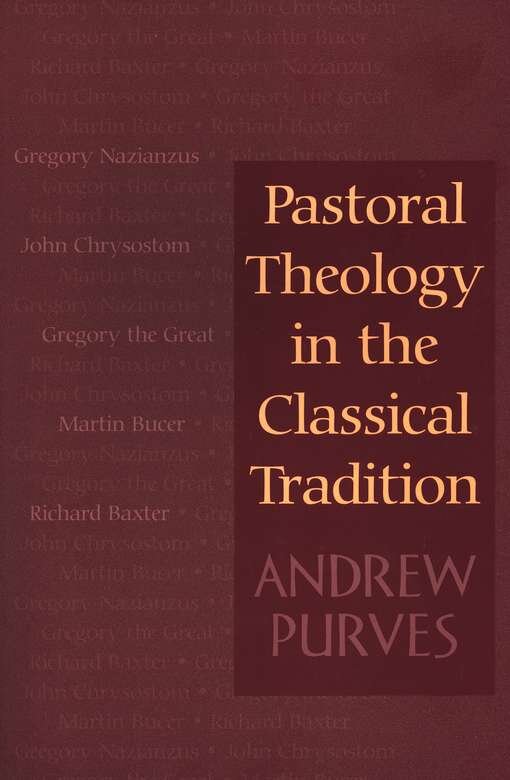Andrew Purves, Pastoral Theology in the Classical Tradition. Westminster John Knox, 2001.
Referenced in: Pastoral Theology
LifeandLeadership.com Summary
This volume conveys the same essential message as Purves’ Reconstructing Pastoral Theology (2004), that most twentieth century pastoral practice is “dominated by psychological theory and oriented towards self-realization,” but that “classical pastoral care was much more obviously constrained by matters of theology – indeed, by matters of doctrine.” (5) In this book, he shows how the Greek Fathers, Reformers, Puritans, and others were more theological in orientation, and that this was the primary vein of most pastoral theology until the modern pastoral care movement that was more therapeutic in orientation. In Reconstructing Pastoral Theology (academic), The Crucifixion of Ministry and The Resurrection of Ministry (less technical), he continues this classic tradition by actually offering his own pastoral theology for the 21st century.
Purves expresses his thesis:
“My conviction is that the basic reconstructive task for pastoral theology today is to establish once again the fundamental connection between the Christian doctrines of God, redemption, and hope, and the pastoral ministry of the church. To my mind, reestablishing this connection is the single most important conclusion that can come from the study of classical texts in pastoral theology. Why does Gregor of Nazianus insert a section on the doctrine of the Trinity in the middle of his treatise on pastoral care? Why did John Chrysostom go to great lengths to try to avoid ordination? Why is Gregory the Great so concerned with the spirituality of the pastor? Why Does Martin Bucer labor over the doctrine of sin and redemption in his understanding of true pastoral care? Why is Richard Baxter a pastoral evangelist? The short answer is that these pastoral theologians understood that pastoral ministry is the lived action in and through the church by the power of Holy Spirit on the ministering reality of God in Christ for salvation. For them, pastoral care is lived out doctrine at the points of connection between the Gospel and the lives of God’s people.” (4)
This book is a reflection on the writings of five authors who convey this classic tradition. The first three have “two marked features: 1) a high view of the calling to ministry and a consequential awareness of one’s unfitness for office; and 2) a sense of the extraordinary complexity of and sacrifice demanded by the pastoral office and a subsequent awareness of the depth of intellectual, moral, and spiritual preparation that is required.” (6)
- Gregory of Nazianus, “In Defense of His Plight to Pontus” (d. 389)
- John Chrysostom, Six Books on the Priesthood (d. 407)
- Gregory the Great, Pastoral Care (d. 604)
The other two strike a similar vein, but come from different periods:
- Martin Bucer, On the True Pastoral Care – A Reformer at Strasbourg who wrote a systematic treatise on pastoral care
- Richard Baxter, The Reformed Pastor – A 17th century English Puritan whose work became the standard for Protestant pastoral work.
Purves provides a brief biography for each author, a summary of his major themes followed by a more thorough development, all with frequent observations on the significance for pastoral work today. The conclusion synthesizes the important features into eight points:
- Pastoral Theology and Pastoral Care are Explicitly Confessional in Context
- Pastoral Theology is a Discipline, and Pastoral Care is a Practice, Deeply Rooted at All Points in the Study of the Bible
- Ministry is a High Calling to a Holy Office, the Faithful Exercise of Which is Necessary for the Salvation of Christ’s People
- Pastoral Work Demands Taking Heed to Oneself to the End that He or She is Theologically, Spiritually, and Ethically a Mature Person
- God Will Hold Pastors Accountable for the Exercise of the Pastoral Office and the Care of God’s People
- Pastoral Care is the Art of Arts
- Pastoral Ministry is Contextual and Situational
- Pastors Deeply Committed to the Church Wrote the Classical Texts
This is a brief text (approximately 125 pages) and an excellent read, especially alongside Purves’ Reconstructing Pastoral Theology.
From the Publisher
Too often pastoral care is uninformed by historical practice and is overly influenced by psychological theory and practice, according to Andrew Purves. At least one consequence of this is that it is often disaffiliated from the church’s theological heritage. Purves examines Christian writers from the past who represent the classical tradition in pastoral theology—classical in the sense that they and their texts have shaped the minds and practices of pastors in enduring ways. He reflects on texts from Gregory Nazianzus, John Chrysostom, Gregory the Great, Martin Bucer, and Richard Baxter. He includes a brief biography of each author, introduces the major themes in the writer’s theology, and discusses the issues arising for pastoral work.
About the Author
Andrew Purves is the Hugh Thomson Kerr Professor of Pastoral Theology at Pittsburgh Theological Seminary.
***For additional information on this resource, including reviews, click the bookstore links. Check the reference at page top or the links below for resource guides on related topics.***
Related Areas
See Other Resource Guides on Pastoral Theology:
- Minister Self-Care
- Ministry Burnout, Prevening and Overcoming
- Ministry Ethics
- Ministry Support Systems
- Strengthening and Renewing the Ministry Call
- Theology of Mission and Ministry
See Resources on Over 100 Ministry Topics:


